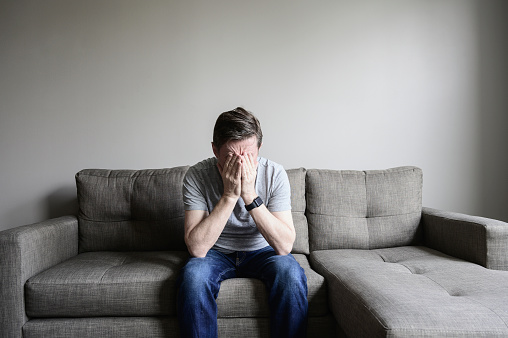As we transition into May, many people are busy preparing to celebrate Cinco de Mayo, Mother’s Day and Memorial Day. However, May is also Mental Health Awareness Month in the United States.
Mental Health Awareness Month was implemented in 1949 by Mental Health America. Each year, Mental Health America partners with local mental health organizations around the country to host events, film screenings and other promotions to raise awareness about mental health conditions and treatments.
Mental health conditions are common in the U.S. with nearly one in five adults living with some sort of mental or behavioral condition, reported the National Institute of Mental Health. Mental illnesses include many different conditions and can vary in degree of severity.
Despite the prevalence of mental health conditions in the U.S., only 41% of people with a condition have received professional care or services, according to Mental Health First Aid.
In 2020, 22.2% percent of women sought help for mental health conditions, while in the same year, only 11.3% of men received mental health treatment or counseling.
“Men in the United States have been conditioned to serve others but not serve ourselves. Men have been told that people rely on them so they have to have their stuff together,” said Dr. Bradley Crookston, clinical administrative director for North Range Behavioral Health. “We have always been told women and children go first. So there’s this element of self-sacrifice.”
North Range Behavioral Health provides care for people who face mental health and substance use disorder challenges, with 25 locations throughout Weld County. Crookston said when it comes to seeking therapy, men tend to be more pragmatic and concrete compared to women patients.
“Typically men come in asking how much it is going to cost, how long it is going to last — very pragmatic and very specific aspects of the therapy,” he said. “Men in therapy always ask, ‘Why? Why do I need to do this? Why am I here? What’s the point?’ Where generally with women I don’t get asked those same questions.”
Not only do men typically approach therapy differently, but certain mental health disorders are more common in men than women, according to the Newport Institute. The top five mental health disorders most commonly seen in men are depression, anxiety, substance abuse disorder, post-traumatic stress disorder and bipolar disorder.
“Men experience all the same issues that women experience,” said Kim Collins, chief clinical officer for North Range. “A lot of the issues and services are very similar and apply to both groups, but the path of how they get there and what recovery looks like might be a little bit different for them.”
Some of the symptoms of these five disorders include:
- Aggression and violence
- High-risk activities
- Substance abuse
- Physical issues such as chronic headaches and stomachaches
- Feelings of restlessness and difficulty focusing
- Appetite and weight changes
- Fatigue
- Obsessive thinking
Micaela Sanchez, director of marketing and community outreach for North Range, said they recognize “mental health is not one-size-fits-all.”
“The general messaging is always helpful, and of course, we need to get that out there,” she said. “But what it really comes down to is, let’s acknowledge the differences that men may experience and celebrate the way men already take care of their mental health.”

While health care providers and organizations as well as leaders, celebrities and sports athletes have worked to alleviate the stigma around mental health conditions, treatment and counseling, men are still dragging their feet when it comes to getting help for mental health conditions.
“The generalization that men are not great about talking about what they are going through is pretty accurate,” Dr. Justin Ross with UCHealth said. “First and foremost, I think the first strategy is we need to destigmatize the conversation around men’s mental health by talking about these things as not being problems, per se, but being normal human reactions and experiences.”
Just like women, men are prone to anxiety, stress and burnout, and it is important to recognize and acknowledge that those are “deeply human experiences” and not signs of weakness or a lack of coping skills, Ross said.
Another strategy the mental health industry can implement is to offer programs geared toward men’s interests.
“Men tend to do better when they are engaged in doing something. They are not always going to sit down and just open up to another man about what they are going through,” Ross said. “But, if they are out doing something, if they are out on a hike, if they are out on the golf course or sitting there working on a car or whatever, that is the time for those conversations to flow.
“But they have to be willing to engage in those conversations.”
While destigmatizing conversations around mental health is an important step to creating awareness of mental health issues, men also have to be willing to “lean in and talk about it ourselves or lean in and ask,” Ross said. “Seeking help doesn’t mean anything is wrong with you and I really cannot nail that point down harder.”
Depression, anxiety an everyday struggle for Greeley man
Javier Carrillo was just 13 when depression caused him to attempt suicide and make his first crisis call.
“I was just a kid, so taking a bunch of Tylenol didn’t do it. I remember calling, and I kept it from my parents,” he said. “A lot of my younger years, into my teenage years, it really hindered my education and relationships with friends.”
Depression and schizophrenia are prevalent in Carrillo’s family. His uncle suffered from schizophrenia and ended up hanging himself from a tree, and Carrillo’s older brother also has the condition.
Fast forward to 2001, Carrillo finally went to his doctor for help.
“I remember he gave me a questionnaire, and he was astonished at everything that I checked off like suicide ideation, auditory hallucinations, thoughts of dying, death and morbid thoughts,” Carrillo said. “And that’s when I started the medication routine. I became a guinea pig.”
Carrillo’s physician put him on a cocktail of different medications, tweaking the prescriptions by removing medications that weren’t working and replacing them with alternatives.
“It just kept going on and on, and I ended up on seven different meds,” Carrillo said. “Anti-psychotics, antidepressants, anticonvulsants like Lamictal.”

In 2013, his depression got so bad that Carrillo was hospitalized. It would the first of four different hospitalizations that he would have over the years, the most recent at McKee Hospital in Loveland.
“The doctor explained to me that all the meds I was on were helping, but not doing the job,” Carrillo said. “He suggested electroconvulsive therapy, which is shock therapy.”
Due to the severity of his depression, Carrillo underwent shock therapy on both sides of his brain at the same time.
“Usually they do bilateral, which is one side, and then a couple of days later, they do the other side. But in my case, they did all the way through,” he said. “I went through 18 of those.”
The shock therapy caused side effects including memory issues and phobias. Carrillo became scare of the dark and began having visual and auditory hallucinations.
Unfortunately, the shock therapy didn’t work for Carrillo, and he was back to square one, hoping to find a mix of medications that would curb his clinical depression.
“I went back on the meds, mixing them around, and I got hospitalized again,” Carrillo said.

Carrillo’s wife read about ketamine injections for treating depression, so he started those.
“I’ve lost count of how many ketamine injections I went through, but basically they give you one-half a dose in one arm, come back 15 minutes later, and if you are doing OK, they give you the other half in the other arm,” he said.
Ketamine is a powerful psychedelic, and patients getting shots undergo major “trips.”
“It takes away your ego, it takes away your pride, you are stripped down to your very basic self. There are no opposites. Even if you think ‘ugly’ or ‘beautiful,’ it doesn’t make any sense,” Carrillo said. “There’s no concept of time and you are in a very vulnerable state, and your brain chooses what to work on. Your brain works on past traumas and phobias.”
At first, the shots worked well but have started waning off, and Carrillo continues to experience heavy bouts of depression. He is looking into the possibility of taking psilocybin mushrooms to help with his depression.
“It’s hard because I want a cure. This depression has hindered my employment. I’ve had so many jobs. I’d get fired because I couldn’t get out of bed to go to work,” Carrillo said. “It’s made my marriage very difficult, and we are going to marriage counseling to decide if we should still be married. But it doesn’t look good, and I don’t want to hold her back.”
At 49 years old, Carrillo has accepted that his clinical depression is his cross to carry in life.
And while Carrillo doesn’t know what the future will bring, he tries to take each day one at a time, hoping to have another day without depression or thoughts of suicide.
“I just know that I want to be there for my kids,” he said.
One man’s mental health journey inspires him to help men
Jennings Hester also knows what it is like to suffer from mental health conditions.
“I always tell people I am the stereotypical story of a man with a mental illness in the U.S.,” Hester said. “I started experiencing symptoms at a pretty young age in high school and just had no clue that it could potentially be an illness. I just figured everybody else felt that way or that I was being soft and it wasn’t anything that could really be treated.”
A high-level athlete, Hester went on to play football for the Alabama Crimson Tide under legendary coach Nick Saban.
In his junior year of college, Hester experienced a career-ending injury that turned his world, and mental health, upside down.
“Once I didn’t have football as a crutch and I didn’t have that community, camaraderie and that group of guys, the depression and anxiety got way worse,” he said. “It took me about 15 years to get help from when I first started experiencing symptoms. Close people couldn’t be around me anymore. I was so negative about myself and so toxic to be around that my dad pretty much dragged me (to get help).”

Hester initially saw a psychiatrist and then choose to see a therapist and went through intensive onboarding and therapy.
“Mental health is getting easier to talk about compared to 15 years ago, but it still has a long way to go,” Hester said.
Through his recovery, Hester learned that outdoor activities, specifically fly-fishing, were extremely helpful in his recovery. The positive impact fly-fishing and tying flies had on Hester’s mental health inspired him to want to create something that would help other men dealing with mental health issues.
“I didn’t know what I wanted to do, I just knew that I wanted to do something. I had considered maybe doing something around athlete education and mental health,” Hester said. “It’s hard for men to find a positive community; there’s not a lot of healthy communities for men.”
In 2019, Hester founded Fishing the Good Fight. The nonprofit provides a variety of programs that combine fly-fishing, mental health education and community for men of all ages.
Fishing the Good Fight hosts fly-fishing retreats for men that gets them out in nature and surrounds them with other men interested in improving their own mental health.

Retreats are open to men who have never cast a line as well as experienced fishers. No prior fly-fishing experience is needed. Expert anglers are in attendance to help teach and assist all participants throughout the retreat.
“For both the mental health spectrum and fly-fishing spectrum, we deal with everything. We deal with guys who maybe have never touched a fly rod in their life or even considered seeing a therapist before,” Hester said. “And then we deal with guys who see a therapist every single week and are medicated and fly-fish every couple of days. So it’s all over the board.”
While the retreats focus on the therapeutic properties of fly-fishing, participants also have the opportunity to attend group and one-on-one therapy sessions.

Some of the things the organization says participants will learn at the retreat include:
- Recognizing symptoms and warning signs of mental illnesses
- How to better cope with symptoms
- Skills and techniques for having hard conversations with someone they are concerned about
- A renewed appreciation for the healing power of nature
- New friends and support system
- A better understanding of mindfulness and relationships
Retreats are scheduled for May 13-15 at Lake George and July 22-24 in Carbondale. The cost for retreats is $975 per person and includes two nights of lodging, food and all activities.
The nonprofit’s men’s groups consist of six sessions led by Elevated Counseling, a men-specific therapy practice based in Denver.
For men who may not be able to afford the entire cost of a retreat or men’s group sessions, Fishing the Good Fight offers scholarships.

“When I was first getting treatment, like a lot of guys, I basically had to decide between accumulating some debt for mental health services and for my medicine,” Hester said. “I didn’t want anyone else to be in that position so all of our programs — retreats and men’s groups — can all be applied for to receive financial aid.”
Men are also invited to attend free Tying Nights that foster socializing and introduce men to the hobby of fly-tying. Tying Nights take place at 5 p.m. every other Wednesday at Zuni Street Brewing, 2355 W. 29th Ave., Denver.
The nonprofit is hosting the Green Line Music Festival at 3 p.m. Saturday, May 7 at Local 46 Biergarten, 4586 Tennyson St., in Denver to help raise money and awareness about mental health.

The festival will feature live music from Gasoline Lollipops with special guest Morsel, a silent auction, beer, food and more. All proceeds raised will go toward Fishing the Good Fight to help support the nonprofit’s programs and retreats and fund scholarships.
“Here we are 2 and 1/2 years later, and it’s just crazy how far we have come,” Hester said
For more information about Fight the Good Fight, to purchase flies or gear, or to inquire about an upcoming retreat, go to www.fishingthegoodfight.org.
Getting help for yourself or someone you love
Getting someone to open up about their mental health struggles can be tricky, especially if that person is male. However, Ross has some dos and don’ts for helping men maneuver through the discussion around mental health.
“The first thing is to not make it about you or try to problem-solve,” Ross advises. “This is where men get into trouble in the first place regarding mental health. Typically we want to problem solve. So you come to me with a problem, and I immediately go to, ‘You should do A, B and C.’”
Instead of trying to offer solutions, Ross suggests taking a step back and just listening to what that person is saying, offering support and validating his feelings.
Rather than offering solutions, it’s more effective to come up with collaborative ways to solve the problem with that person.
“Helping people sort of get there on their own without saying, ‘You should go and do a thing,’ because that feels judgmental, it feels blaming and often leads to more internalization and not discussion,” Ross said. “Because again, what men often need is validation and support that what they are going through makes sense.”

For men who attend therapy, the relationship between them and the counselor is really critical, Ross said. That includes building rapport and trust and a feeling “there is a good fit.”
When Ross explains the patient-therapist relationship to his clients, he uses the analogy of buying a new car. Typically you don’t buy the first car you sit in.
“You test-drive a couple, then you figure out what works best for you,” he said. “I think often what happens is that people get discouraged very quickly. They think they went and sat in a therapist’s office, and they were a bonehead, and I didn’t like it so I never went back.
“You have to go and test-drive a few more.”
Ross advises vetting potential therapists just as much as they are asking you questions. Don’t be afraid to ask them questions, and if you don’t feel comfortable, check out someone else.
“Finding the right person is really important to you and your mental health and your overall health,” he said.
In addition, there is a time and place for talking about emotions with male family members or friends.

“Being mindful of learning of when those times are or when they are more likely to be and respecting that when we do bring anything up, we are going to bring it up in those moments,” Sanchez said. “And not have them feel like they have kind of been put on the spot or called out.”
Avoid bringing up issues at the dinner table or in public, Crookston said. Also, referring to talking as stress management rather than therapy is more likely to get buy-in from your male friend or family member.
Sanchez stresses that self-care is a discipline, not a luxury or an optional thing. It’s essential for mental and physical health.
“Self-care enables you to do your job and be successful,” Crookston said.
Mental Health Resources for Men
Credit: Source link































